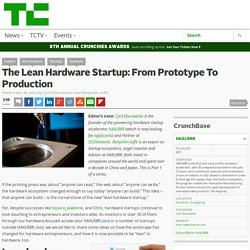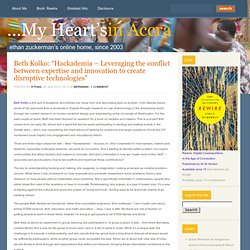

The Lean Hardware Startup: From Prototype To Production. Editor’s note: Cyril Ebersweiler is the founder of the pioneering hardware startup accelerator HAXLR8R (which is now looking for applicants) and Partner at SOSVentures.

Benjamin Joffe is an expert on startup ecosystems, angel investor and Advisor at HAXLR8R. Both invest in companies around the world and spent over a decade in China and Japan. This is Part 1 of a series. If the printing press was about “anyone can read,” the web about “anyone can write,” the hardware ecosystem changed enough to say today “anyone can build.” This idea – that anyone can build – is the cornerstone of the new “lean hardware startup.” Yet, despite successes like Square, Jawbone, and Fitbit, hardware startups continue to look daunting to entrepreneurs and investors alike.
The first challenge for hardware entrepreneurs is to get from your first prototype with 3D-printed parts, duct tape and cardboard to production-ready. Design with the right components. 1. The Hardware Startup Landscape - The Hardware Startup. If you’re reading this book, it’s likely because you’ve decided to start, or are thinking about starting, a hardware company.

Congratulations! Launching a hardware startup is an exciting and challenging undertaking. As the saying goes, “Hardware is hard.” Делать hardware стартапы становится проще / Блог компании Navigator campus. Фаблаб Политех, Санкт-Петербург, Россия. Buildit Hardware Accelerator. Buildit. Хакатон APPS4ALL в Москве / Блог компании Samsung. Equipment at Fab Lab Manchester - Fab Lab Manchester - Welcome to the Fab Lab Manchester website. Digital manufacturing technology At the heart of Fab Lab is digital manufacturing technology, combining 2D and 3D design with the latest fabrication technology.

The Power of Making. I used to have a separate website: The Power of Making.

I got confused about what would be there, and what here, so heaven knows readers must have been confused. Today the web host for PoM want me to renew: seems like a good time to move everything over! Hi, I’m James Hardiman, and I’m passionate about how Making helps us to re-discover who we really are. Aiming (much) higher than Hackspaces and FabLabs… Exclusive: Hardware hack space Lemnos Labs gets new startups and new partner. Lemnos Labs, the San Francisco hardware incubator, is setting itself up for a busy spring.

The hack space has a named Eric Klein (pictured) as a partner and brought startups Sproutling and Pantry in house. This brings the number of Lemnos startups to 11 and the number of partners to three. The news also showcases how the evolution of the internet of things is moving beyond deep tech and connected gadgets into everyday life. The two startups deal with issues near and dear to my own heart: parenting and food. Pantry, a startup that was created 16 months ago, provides a refrigerated kiosk to offices that uses RFID to track the meals stored in the kiosk. The kiosks work by having workers swipe their credit card to unlock the door. On the parenting side, Sproutling offers a sensor system for babies that wraps around an infant’s ankle and monitors its vital signs.
Both startups have received an undisclosed amount of funding from Lemnos as well as space in the facility. Hackerspace a Breeding Ground for Start-Ups, Entrepreneurs. Sacramento’s fledgling Hacker Lab spurring innovation beyond Silicon Valley.

One-hundred miles east of Silicon Valley in a former tattoo parlor, members of the second-largest hackerspace in California are hoping to make a different kind of mark by advancing technology innovation in the state capital, a region known for government, clean tech and sustainable tech, but not high tech. Hacker Lab founders Gina Lujan and Eric Ullrich are driven by the belief that every community should have access to a space to learn about and advance technology. (Co-founder Charles Blas not pictured.) “We are changing the world by providing community resources for education, innovation and creation,” said Eric Ullrich, a co-founder of Hacker Lab in Sacramento. “It’s all very exciting.
Game funding and incubator – GameFounders.com. Startup Canada Communities » Hackerspace. If you are the type of person who loves to get your hands on power tools, or revels at the thought of making new gizmos and innovative thingamabobs, find out where your local Hacker Space, Maker Space or Fabrication (Fab) Lab is.

Often they will be connected to coworking establishments, are possibly connected to local colleges, and are geared towards community building. Episode 2: Accelerator or Hackerspace? Is Robot Launchpad an accelerator or a hackerspace?

Both. Right now we’re testing the viability of opening a robot hackerspace. Theoretically, this makes a lot of sense. I believe that the hackerspace and maker movement are fueling a resurgence of growth in hardware startups. Chris Anderson’s new book Makers: The New Industrial Revolution, argues that we are seeing the third wave of the industrial revolution which started back in the 18th century. Beth Kolko: “Hackademia – Leveraging the conflict between expertise and innovation to create disruptive technologies” Posted by Ethan on Jan 25th, 2012 in Berkman | 1 comment Beth Kolko is the sort of academic who follows her muse from one fascinating topic to another.

Colin Maclay traces some of her past work from a doctorate in English through research on use of technology in the developing world, through her current research on human-centered design and engineering at the University of Washington. For the past couple of years, Beth has been focused on research for a book on hackers and makers. This is a project that comes from her daily life, where she’s spent the last six years participating in hacking and making events in the Seattle area – she’s now considering the implications of hacking for academia and larger questions of how the DIY movement could impact civic engagement and educational reform. Theory. Theory about hackerspaces comes from various disciplinary traditions and cuts across methodological and theoretical traditions.

The following is therefore a loose and evolving set of links that reflect the diversity of interest in hackerspaces loosely organized from micro (individual) to macro concerns. Areas[edit] Learning theory - how can the activities in hackerspaces be seen as learning? Rafi Santo's hacker literacies video article Critical making Matt Ratto's critical making lab at the University of Toronto lab article Garnet Hertz' critical making book (art) Carl DiSalvo's work on adversarial design (design approach) Beth Kolko runs a program called "hackademia" Jentery Sayers tinker-centric pedagogies Critical theory and cultures of hackerspaces - what are are the intersections between hackerspaces and shared culture (F/OSS, hacker culture, etc.)?
How do they relate to larger political and economic issues? Online Articles[edit] Mailing-List[edit] Videos[edit] See Also[edit] Hackerspace Software. Running a hackerspace is a lot of work, and a lot of spaces have rolled their own software to automate some of that work. Most of that code is not maintainable enough to be reused by other spaces. To make things better, folks from the Metalab started their own hackerspace operating system and opensourced it. Other hackerspaces like Netzladen are already testing the software for their own use, and further development.
Hackerspace Hardware. HackerspaceWiki. ACCELERATE YOUR ROBOT STARTUP. Accelerators & Incubators (global) Hackerspaces as Startup Incubators. Hackerspaces as Startup Incubators.